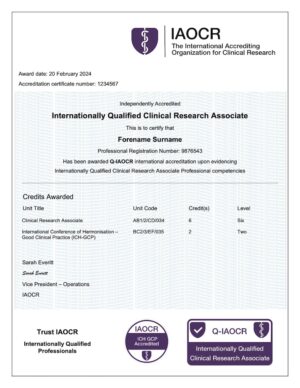Dr Roberto Aguirre is VP, Global Research Director at AGA Clinical Trials, a leading clinical trial site that strives on excellence and collaboration. Roberto’s career led unexpectedly into Clinical Research when he moved to the USA and he has excelled in the field ever since. Learn about Roberto’s journey and valuable insights below.
- How did you get into the Clinical Research Industry and what career path did you take?
I graduated as a physician in Ecuador and then moved to the USA in 2004, and my first role in clinical research was as a Coordinator. I chose this route because I wanted to broaden my experience as much as possible and I felt by working as an Investigator, I would gain valuable insights and understanding of the Pharma Industry that would make me a more rounded physician. Since becoming established in clinical research, I have found it hugely rewarding and insightful, which is why I am now the VP and Global Research Director for AGA Clinical Trials.
- What do you think the top three challenges are for our Industry in the next few years?
Personally, the first challenge to note is the need for competent workforces across the Industry; research related professions are not recognized as healthcare related professions in the US and there are no specialist schools or programs for clinical research like you find for lab technicians and ultrasound technicians (for example) and this creates a barrier for getting started in the Industry. People don’t know about this as an Industry, and therefore don’t know how to get involved to start a career in the future.
The second challenge I would say, is the need for greater collaboration across the Industry. Unfortunately, in my experience the Industry does not give research facilities the respect they deserve, even though we are the ones providing the data which is central to the approval of their medications and their business! We are the ones recruiting for the trials and really guiding these scientific projects whether it is a medication, a device, a nutraceutical or a vaccine; but yet it feels like we are rarely listened to.
Thirdly, and related to the second point, is the very real need to provide a proper voice to research facilities to sit at the table from early stages of development. Sites are never called to provide proper feedback on protocol development, where they could provide really tangible insights, e.g. will it be a recruiting or safety nightmare. The Industry does not have their feet on the ground in these circumstances and therefore they don’t know the reality of how a clinical trial is run inside and outside a research facility.
- What do you see as the first step in addressing these challenges?
We really need a mindset change to address all three of these challenges. Challenge what we know as the ‘norm’ for our Industry, consider what works and create change. The Industry needs to start seeing research facilities as equals; places that provide solutions and have the necessary resources and are able to give and receive feedback in all areas of the clinical trial process. We have all the tools already at our disposal to advance the Industry and effect change, but we’re not using these tools to their fullest at the moment.
- What company/organization within Clinical Research inspires you and why? How do you think you can learn from it?
Regeneron, and the collaboration with Roche, are really inspiring to me and I speak from first-hand experience. Working with them as their clinical trial partners, they have allowed us to make changes and suggestions throughout all stages of trial development to the benefit of the trial. This open and collaborative approach happens because they have recognized the value of all stakeholders within the Clinical Research Industry and more organizations should strive for this approach as the Industry’s future stems from collaboration and cooperation.
- What other industry do you think Clinical Research could take inspiration from?
Thinking laterally, I believe there is a lot we can learn from the restaurant and hospitality businesses. These businesses are focused on ensuring the customers have the best possible experience, and communication is a key part of that process. Whist in Clinical Research it is slightly different from customers, ultimately, we want our patients to have a positive experience each and every time they engage with us. We want this to be such an experience that we become their first choice when looking for clinical trial services and improve their health when other options have been exhausted.
- What do you think the patient population would say about Clinical Research Industry?
My understanding from the patient population is that they will say that there is a lot for our Industry to improve on. The general consensus I get, is that the money available should be invested into educating the general population on the value of clinical research, what being involved in research actually looks like, and the potential improvements that come from it. Too much is spent on vendors who actually add little to the end results.
- What role do you think certification and awards can play in the future of the CR Industry?
I think certification and awards are the key step in our future as they provide a clear and decisive way to prove ourselves and demonstrate how we want to get better; we want to improve ourselves from the inside, and ultimately offer better continuity in every project. Certifications and awards help push to educate the upcoming generations to achieve excellence and recognition, at the individual or collective level.
- Do you think the Industry is committed enough to adopting competence verification of its workforce to ensure global consistency and best practice standards? If not, what is needed to ensure that this is achieved?
Sadly, no they are not. The perception is that they are only concerned and focused on the finances that they will achieve as a result of the hard work of the people who make all the effort to get the certifications. I rarely see an environment where organizations cultivate their employees to improve and to be better, and this is a shame. Certifications and Accreditations can help to improve our Industry and this attitude needs to shift for the better.
- What is your vision for AGA Clinical Trials’ future?
I am excited for AGA Clinical Trials’ future, which will be achieving global recognition for the workplace in every trial we conduct. Us becoming the voice of research education development in countries like USA, Latin America, and beyond.
- What advice would you give to someone starting out in their clinical research career?
Love what you do, what you have in front of you, the people you meet, the opportunities you get, enjoy your efforts and the opportunities that your education has opened for you! Don’t be discouraged or bored because something seems repetitive, every patient that you educate on why clinical trials are needed for the benefit of all of us is a huge achievement, from children to seniors, it is a win. Research means people can live after a bout of disease where previously they might not have, and this is because of research.
- What would you like your lasting legacy to the Clincal Research Industry to be?
This is something I’m still working on, watch this space….










